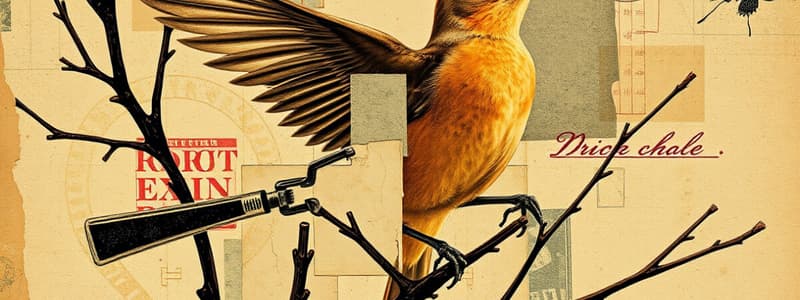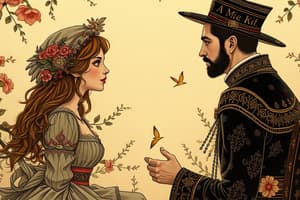Podcast
Questions and Answers
Why was Scout so upset with Cecil Jacobs?
Why was Scout so upset with Cecil Jacobs?
Cecil announced that Scout's father defends black people.
What does Atticus mean when he tells Scout, 'Don't say n***** , Scout. That's common'?
What does Atticus mean when he tells Scout, 'Don't say n***** , Scout. That's common'?
Atticus is teaching Scout to have respect for everyone and to avoid using derogatory language.
What job did Atticus take, and why are people saying mean things about it?
What job did Atticus take, and why are people saying mean things about it?
Atticus is defending Tom Robinson, a black man, and people criticize him because of the town's racism.
What is the main reason Atticus is defending Tom Robinson?
What is the main reason Atticus is defending Tom Robinson?
What advice did Atticus give to Scout about dealing with people who say hurtful things?
What advice did Atticus give to Scout about dealing with people who say hurtful things?
What does Atticus mean when he says, 'Simply because we were licked a hundred years before we started is no reason for us not to try to win'?
What does Atticus mean when he says, 'Simply because we were licked a hundred years before we started is no reason for us not to try to win'?
Does Scout attempt to heed her father's advice? Why or why not?
Does Scout attempt to heed her father's advice? Why or why not?
Where does Atticus' family go each Christmas? Who all is there?
Where does Atticus' family go each Christmas? Who all is there?
How is Francis related to Scout? How does she feel about him? Explain, providing evidence.
How is Francis related to Scout? How does she feel about him? Explain, providing evidence.
Why does Scout insist on swearing so often? How is it part of a larger plan? Is the plan working? Why or why not?
Why does Scout insist on swearing so often? How is it part of a larger plan? Is the plan working? Why or why not?
In this chapter, there are several references made to what 'boys should do' and 'girls should do.' Find examples of this, and explain whether or not this is a similar expectation today.
In this chapter, there are several references made to what 'boys should do' and 'girls should do.' Find examples of this, and explain whether or not this is a similar expectation today.
What does Francis say about Dill? What ideas does he say about Atticus?
What does Francis say about Dill? What ideas does he say about Atticus?
Where is Francis likely to get his ideas about Atticus? Why is this worth noting?
Where is Francis likely to get his ideas about Atticus? Why is this worth noting?
What is Maycomb's usual disease that Atticus hopes his children won't catch?
What is Maycomb's usual disease that Atticus hopes his children won't catch?
Why did Atticus want Scout to hear every word that he told Jack?
Why did Atticus want Scout to hear every word that he told Jack?
Study Notes
Key Characters and Relationships
- Scout Finch is affected by the derogatory remarks made by Cecil Jacobs regarding her father, demonstrating the impact of racism on children.
- Atticus Finch maintains respect for all individuals, advocating for dignity and morality, even in the face of prejudice.
- Tom Robinson is the black man Atticus defends, reflecting the racial tensions and discrimination present in their town.
Themes of Justice and Morality
- Atticus accepts the defense of Tom Robinson as a moral obligation, stating that he wouldn’t be able to uphold his self-respect or his civic duties if he refused.
- The significance of Atticus's defense lies beyond the trial outcome; it represents the fight for justice and the importance of every person's voice, especially in a biased legal system.
- Atticus encourages resistance to prejudice and emphasizes the need to uphold convictions regardless of public opinion.
Family Dynamics and Expectations
- Scout grapples with societal expectations of gender roles; her conflict with wearing dresses versus trousers highlights the restrictive norms imposed on girls.
- The tension between familial expectations and personal identity is portrayed in Scout’s interactions with her relatives, particularly with Francis, who embodies negative stereotypes.
Social Commentary
- Racism is personified as "Maycomb's usual disease," a pervasive issue Atticus seeks to protect his children from.
- The dialogue around Dill, described as a "stray dog" without a home, underscores societal neglect and the notion of belonging.
- Francis, influenced by Aunt Alexandra, perpetuates derogatory attitudes towards Atticus and his choices, illustrating how family perspectives can shape individual beliefs.
Personal Growth and Lessons
- Scout learns to navigate conflict without violence, showcasing her development and understanding of her father's guidance.
- Atticus's conversations with Scout and Jack serve as a preparatory lesson for navigating future hardships and maintaining integrity in the face of adversity.
- The chapter explores Scout’s use of language and rebellion against authority, reflecting her struggles with conformity and identity.
Community and Isolation
- Family gatherings at Finch's Landing reveal complexities within the Finch family dynamics and the varying attitudes among relatives towards social issues.
- The chapter portrays Maycomb as a community rife with division, contributing to the overarching narrative of prejudice and moral virtue in "To Kill a Mockingbird."
Studying That Suits You
Use AI to generate personalized quizzes and flashcards to suit your learning preferences.
Description
Explore the key characters and their relationships in Harper Lee's 'To Kill a Mockingbird'. This quiz delves into themes of justice, morality, and the impact of racism on families. Test your understanding of how these dynamics shape the narrative and character development.




